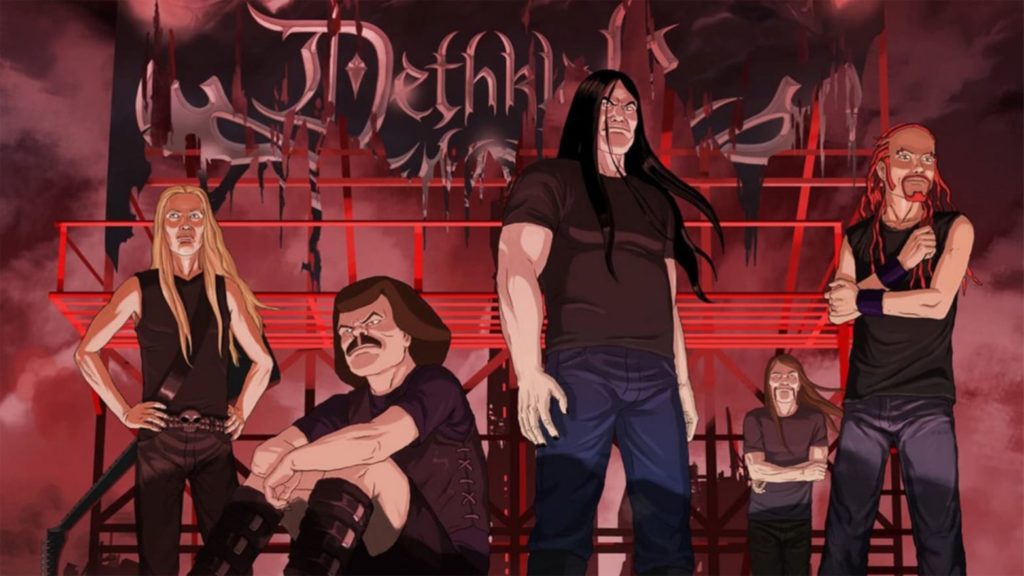‘Metalocalypse: Army of the Doomstar’ Review – Dethklok’s Comeback with Satisfying Conclusion

Emerging from the wreckage of TV cancellations, the animated cult favorite Metalocalypse has re-emerged with a thunderous proclamation in Army of the Doomstar. The saga of Dethklok, the world’s preeminent death metal ensemble, starts precisely where the show ended; this new feature-length opus stands as a direct continuation of the 2013 metal opera, The Doomstar Requiem. Long-awaited closure to lingering narrative threads unravel within this crescendoing musical odyssey, teeming with infernal fire and cataclysmic stakes.
In the Metalocalypse universe, Dethklok’s dominion as supreme metal titans exerts a profound impact on the global society and its economic landscape. An ever-watchful governmental gaze closely observes the band’s every move and the cascading effects they create within society. The five members constituting Dethklok—Nathan Explosion, the lead singer (portrayed by Brendon Small); William Murderface, the bassist (played by Tommy Blacha); Skwisgaar Skwigelf, the lead guitarist (also Small); Pickles, the drummer (also Small); and Toki Wartooth, the rhythm guitarist (depicted by Blacha)—gravitate towards indulging in wild festivities and the allure of adoring fans. Metalocalypse keenly satirizes not just the realm of music but also the fervent world of fandom and the broader spectrum of human existence.
“Metalocalypse: Army of the Doomstar” picks up directly from the conclusion of “The Doomstar Requiem,” finding the group having successfully rescued Toki and the producer Abigail from the clutches of former band member Magnus Hammersmith (Brendon Small) and their arch-nemesis, the Metal Masked Assassin (George “Corpsegrinder” Fisher of Cannibal Corpse), whom they seemingly overcame. However, all is not harmonious within Dethklok. As their fans demand a new album and tour, a cloud of turmoil descends since Nathan finds himself ensnared by PTSD, which startlingly leads to an unprecedented loss of his self-assurance—an astounding twist in the annals of the series.
Dangers loom not only for Dethklok but for civilization at large. Yet, of comparable urgency is a malevolent conspiracy orchestrated by the Masked Metal Assassin and Salacia (Mark Hamill), also known as “The Half-Man,” as dubbed by his former Tribunal associate General Crozier (Victor Brandt), who characterizes him as “a beast, not of this Earth.” General Crozier himself has fallen under the sway of these supernatural antagonists, and similarly, the bassist Murderface seems to have been ensnared—a notion alluded to by The Doomstar Requiem’s closing scene, in which he appeared to be infected by an arcane force. The sinister duo’s malevolent plan unfolds in three prongs: to initiate the Metalocalypse, to obliterate the enigmatic Army of the Doomstar (a mysterious combat unit named after a colossal, fiery star in the heavens), and to thwart Nathan’s creation of “The Song of Salvation,” a legendary melody fated to rescue humanity. While the intricacies might be somewhat confounding in written form, and the execution doesn’t necessarily offer clarity, “Metalocalypse: Army of the Doomstar” doesn’t hinge on narrative lucidity; instead, it thrives on relentless tumult and unadulterated lunacy. In this domain, the film adeptly delivers an onslaught of frenetic chaos.
In “Metalocalypse: Army of the Doomstar,” the lineage of humor and stylistic elements from its predecessors is seamlessly upheld, albeit magnified to the point of exuberant cinematic grandeur. Infusing its narrative with aesthetic grandeur, one finds a melodic counterpart in operatic orchestral arrangements and, naturally, heart-pounding metal anthems.
While perhaps the most unconventional and audacious music series to date, at its core, Brendon Small and Tommy Blacha’s “Metalocalypse” chronicle emanates as an earnest tribute to the electrifying extremities of metal music. It also pays homage to the notion that music is intrinsically intertwined with life—a force potent enough, when rendered loud and fervent, to potentially salvage the world itself.
Collectively, a pleasing satire that cleverly lampoons the realm of music and heavy metal, lightly seasoned with contemporary sensibilities.
Undoubtedly, it serves as a gratifying finale to the television series. Looking ahead, the fervor and anticipation among fans could potentially provide Brendon with ample prospects to craft a fresh narrative within the expansive universe of Metalocalypse.
